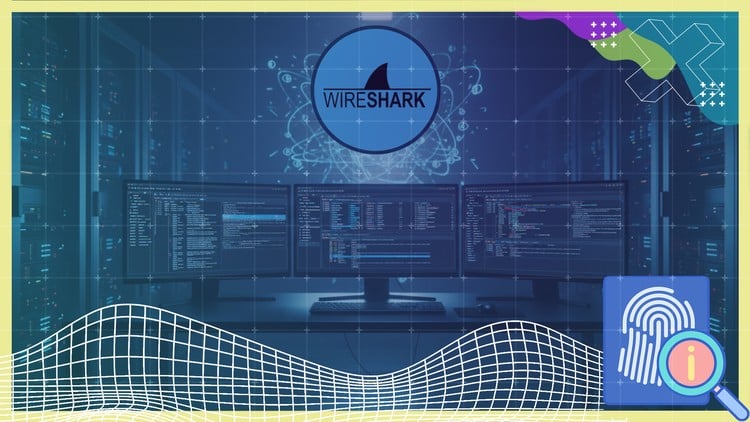
Mastering Advanced Wireshark for Proactive Threat Hunting, C2 Detection, and Actionable Digital Evidence Collection
⏱️ Length: 7.2 total hours
👥 79 students
Add-On Information:
Note➛ Make sure your 𝐔𝐝𝐞𝐦𝐲 cart has only this course you're going to enroll it now, Remove all other courses from the 𝐔𝐝𝐞𝐦𝐲 cart before Enrolling!
- Course Overview
- This intensive course is meticulously designed to transform your understanding of network traffic from a passive observation into an active weapon for cyber defense. Beyond basic packet inspection, you will delve into the art and science of leveraging Wireshark’s deepest functionalities to proactively hunt for sophisticated threats, uncover clandestine command-and-control (C2) channels, and meticulously gather digital evidence that stands up to scrutiny.
- You will learn to interpret the nuanced language of network protocols, discerning the subtle anomalies that betray malicious intent. The curriculum emphasizes a pragmatic, investigative approach, equipping you with the methodology to move beyond raw data to derive actionable intelligence crucial for securing modern enterprises.
- Participants will gain a comprehensive understanding of how to operationalize Wireshark in real-world scenarios, from live network monitoring to post-incident analysis of forensic captures. This course is about cultivating a forensic mindset, enabling you to construct compelling narratives from fragmented network events and fortify your organization’s security posture against an evolving threat landscape.
- Requirements / Prerequisites
- Fundamental Networking Concepts: A solid grasp of TCP/IP stack, common network devices, and basic network services (e.g., DHCP, NAT).
- Basic Wireshark Familiarity: Prior experience navigating the Wireshark GUI, opening capture files, and applying simple display filters is essential. This course builds upon foundational knowledge.
- Command Line Interface (CLI) Proficiency: Comfort with using terminal commands in Linux or PowerShell in Windows for basic file operations and tool execution.
- Conceptual Understanding of Cybersecurity: Awareness of common attack vectors, malware types, and basic security principles will be beneficial.
- System Access: A computer capable of running Wireshark and potentially a virtual machine environment for lab exercises.
- Skills Covered / Tools Used
- Packet Analysis Methodologies: Develop structured, hypothesis-driven approaches for investigating large network datasets.
- Advanced Filtering Logic: Master complex capture and display filters using Boolean logic, regular expressions, and protocol-specific fields for precise event isolation.
- Contextual Data Correlation: Integrate packet data with other security sources like SIEMs, endpoint logs, and threat intelligence for enriched investigations.
- Protocol Dissector Mastery: Leverage Wireshark’s extensive dissectors to identify non-compliant or malicious behavior hidden within application-layer protocols.
- Network Behavior Anomaly Detection: Implement techniques for establishing network traffic baselines and rapidly identifying statistical outliers indicative of compromise.
- Comprehensive Stream Reconstruction: Reconstruct entire communication sessions (e.g., file transfers, web browsing, email) from fragmented packet captures.
- Security Event Timeline Creation: Craft precise chronological timelines of network-based security incidents, essential for post-breach analysis and reporting.
- Custom Profile Optimization: Efficiently manage and deploy custom Wireshark profiles and configuration sets tailored for various forensic and hunting tasks.
- Ethical Packet Capture Practices: Adhere to best practices for ethical network data acquisition, ensuring compliance and maintaining strict chain of custody for digital evidence.
- Integrated Toolchain Usage: Understand Wireshark’s pivotal role within a broader cybersecurity incident response and threat hunting ecosystem.
- Benefits / Outcomes
- Proactive Threat Hunting: Transform into an effective threat hunter, capable of actively identifying and neutralizing advanced threats and sophisticated attack campaigns.
- Expert Incident Response: Significantly enhance your capability to lead or contribute to complex incident response efforts, accurately pinpointing the scope and root cause of security breaches.
- Elevated Forensic Readiness: Cultivate a robust forensic mindset, ensuring every network capture is treated as potential evidence, maintained with integrity, and prepared for legal or internal review.
- Deep Understanding of Attacker TTPs: Gain unparalleled insight into how adversaries operate at the network layer, revealing their reconnaissance, exploitation, and data exfiltration techniques.
- Strategic Security Posture Improvement: Apply insights from network forensics to recommend and implement impactful security controls, profoundly improving an organization’s overall resilience against cyber threats.
- Career Advancement: Position yourself as an invaluable asset in cybersecurity, qualified for advanced roles such as Threat Hunter, Senior Incident Responder, or Network Forensic Analyst.
- Confident Evidence Presentation: Develop the skills to articulate complex network findings clearly and concisely to both technical and non-technical audiences, supporting critical decision-making.
- Reduced Time to Resolution: Drastically cut down the Mean Time To Detect (MTTD) and Mean Time To Respond (MTTR) to security incidents by pinpointing critical events faster and with greater accuracy.
- PROS
- Highly Practical & Hands-On: Emphasizes real-world application through practical scenarios and exercises.
- Deep Dive into Advanced Techniques: Moves significantly beyond basic Wireshark usage, covering intricate analysis methods.
- Directly Applicable to Current Threats: Focuses on modern threat hunting and forensic methodologies relevant today.
- Cultivates a Forensic Mindset: Instills critical thinking necessary for evidence collection and integrity.
- Instructor-Led Expertise: Benefits from professional guidance on complex topics and nuanced interpretations.
- CONS
- Assumes Prior Foundational Knowledge: May pose a steep learning curve for individuals without a basic understanding of networking or Wireshark.
Learning Tracks: English,IT & Software,Network & Security
Found It Free? Share It Fast!